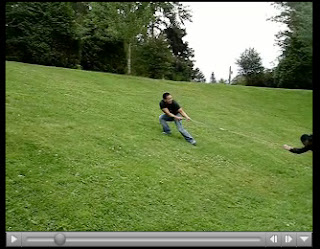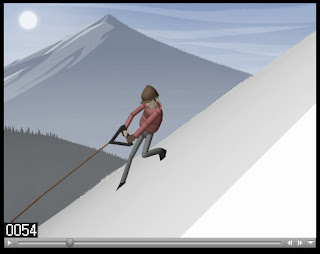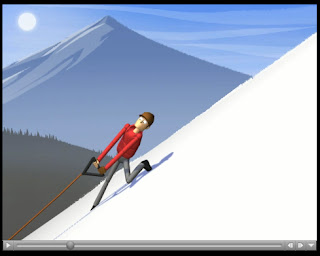Someone wrote me recently asking how I approached animating more physical shots, like my work in games for example. So I thought I'd post my general steps for a more physical shot I had done for AM. Not to say this way is the best or only way, but its what made most sense to me. I still have a lot to learn.
The assignment was an exercise in weight. So I chose to show a sense of weight by way of a heavy pulling situation. I'd never do this for every animation at work, but the intent here was to clarify my ideas to my mentor, Greg Kyle:

Once I was sure it all made sense to him, I went off and shot some video reference. Again I don't always do this at work. But I can say that my better stuff has come with the help of shooting or frame-by-framing video reference of some sort. This helps me break out of my cliche thinking of how I "think" something would move:

From that vid ref, I try to start cherry picking stronger poses and accentuating them. Here I'm just trying to focus on a simple clear lines of action, reverse curves, that sort of thing. This is the thing I always do at work. Except they're always messier than this. I think, again, I was just trying to clarify my ideas for my mentor to see:

I jump in and try my best to match those poses. I treat the keys like drawings and spend alot of time trying to execute great poses. After that I space them out and play with the timing. Just making sure theres enough variety in both of those areas. Oh and I never really use stepped blocking at work. Again, I guess this was just my way of clarifying myself to Greg:

To get to this iteration is like a hundred steps later, haha. But after the timing on the main keys are working. I convert to spline mode and by then it looks ridiculous. So I added breakdowns and by then there is a key at about every 2-3 frames. Then I go in and just animate the root node
so that its arcs are nice and that spacing works. Then to the spine, head, legs, arms, usually in that order. By the end I make sure every thing is delaying or leading where it should, and all the arcs are ....."arc-like"=P. Even tracking the arc on the nose to ensure the movement on the head is solid, which is a trick I learned way later:

So there you have it! Far from perfect, but I hope this made sense and was of some help. Now, if you want to see some
real animation, check
this out.









